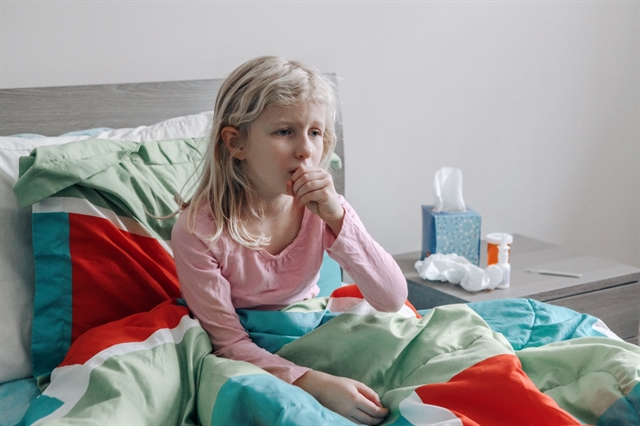
|
| Dr Mattias Larsson. Photo courtesy of Family Medical Practice |
Dr Mattias Larsson*
Hương is a lively nine-year-old girl, good in school and sports. She had however been coughing for about two weeks, especially during the night, which deprived her from sleep. One morning she woke up with a high fever, headache, and sore throat.
When the fever approached 40 degrees Celsius the parents took her to a clinic where they tested for Influenza A, dengue and COVID but it was all negative. As she had a sore throat the doctor diagnosed throat infection and treated with antibiotics, Augmentin. However, after five days of treatment her condition worsened, and she also had developed diarrhea. The parents then took her to Family Medical Practice for examination.
The paediatrician found that she had high fever, rapid breathing, and fatigue. He checked the prior results and ordered blood tests (CBC and CRP) which showed that she had a severe infection, however most likely viral. For more accurate diagnosis the pediatrician suggested a new test, nasopharynx PCR, that could test more than 20 different pathogens at one time and takes only two hours to get the result.
The test results showed she had three different pathogens: Rhinovirus, Respiratory syncytial virus (RSV) and Mycoplasma pneumoniae. The doctor explained that since FMP started PCR diagnostics, they have observed a significant number of patients with multiple concurrent infections. This suggests that when a person is already infected, their immune system becomes preoccupied, thereby increasing the risk of acquiring additional infections.
The parents were interested and asked a bit more about how common it was with multiple infections and what infections are the most common. The paediatrician explained that about one third of the PCR results had several pathogens at the same time, mostly two but sometimes three or even more infections. In the last months there had been many patients with high fever, respiratory symptoms, sore throat, headache, and fatigue.
When analysing the recent results, the most common cause was influenza A that can be diagnosed with rapid test or PCR. Streptococcal tonsillitis was the second most common, which presents with sore throat and pain when swallowing, is diagnosed with Strep A rapid test, and can be treated with antibiotics. The third most common detected with PCR is bronchitis with RSV and Rhinovirus, in half of the cases these are mixed infection with both viruses which cause more severe infection.
COVID was the fifth most common but often not that severe in kids. Adenovirus, Human Metapneumovirus, Parainfluenza virus and Influenza B and are also detected. The treatment for these viruses is symptomatic with fever medication, expectorant and if needed nebuliser. Mycoplasma pneumoniae can cause long term cough, low fever, headache, and fatigue, in addition also affect the immune system with higher risk for secondary viral infections, as for Hương. It can be treated with antibiotics for intracellular bacteria as macrolides, however, some resistance has been detected, so sometimes stronger antibiotic is needed.
Respiratory bacteria such as Streptococcus pneumoniae, Haemophilus influenzae and Moraxella catarrhalis causing pneumonia and sinusitis can also be diagnosed with PCR. It is however important to take a representative sample of sputum as these bacteria may colonize the nasopharynx without causing disease. Dengue is common during the rainy season/ autumn and can be detected with blood tests.

|
| Lately a significant number of patients with multiple concurrent infections has been observed. Photo shutterstock.com |
PCR can also be used to rapidly diagnose other diseases such as gastrointestinal infections where bacteria, viruses and other pathogens causing diarrhea can be detected in stool, enabling that the correct treatment can be provided timely.
After some days of treatment Hương improved, the cough decreased and fever disappeared, she could breathe normally and could go back to school. The parents were satisfied with the result and Hương recovered.
In complicated cases where the symptoms develop and change the patient might be infected with several different pathogens. In some cases, PCR may be needed to find the cause and treat it correctly. At Family Medical Practice we have the capacity for PCR diagnostics of multiple concurrent infections. Family Medical Practice
*Dr Mattias Larsson is a paediatric doctor at Family Medical Practice and associate professor at Karolinska Institutet and has a long experience in research on infectious diseases. He has worked with the Oxford University Clinical Research Unit and the Ministry of Health of Vietnam. He is fluent in English, Swedish, Vietnamese, German and some Spanish.
Visit Family Medical Practice Hanoi 24/7 at 298I P. Kim Mã, Kim Mã Ward, Ba Đình Dist.
To book an appointment, please call us at (024).3843.0784 or via Whatsapp, Viber or Zalo on +84.944.43.1919 or email [email protected].
FMP’s downtown location in Hồ Chí Minh City is in Diamond Plaza, 34 Lê Duẩn Str, Bến Nghé Ward, District 1, and 95 Thảo Điền Str, District 2. Tel. (028) 3822 7848 or email [email protected].
- Reduce Hair Loss with PURA D’OR Gold Label Shampoo
- Castor Oil Has Made a “Huge” Difference With Hair and Brow Growth
- Excessive hair loss in men: Signs of illness that cannot be subjective
- Dịch Vụ SEO Website ở Los Angeles, CA: đưa trang web doanh nghiệp bạn lên top Google
- Nails Salon Sierra Madre
 VnExpress News The News Gateway of Vietnam
VnExpress News The News Gateway of Vietnam





